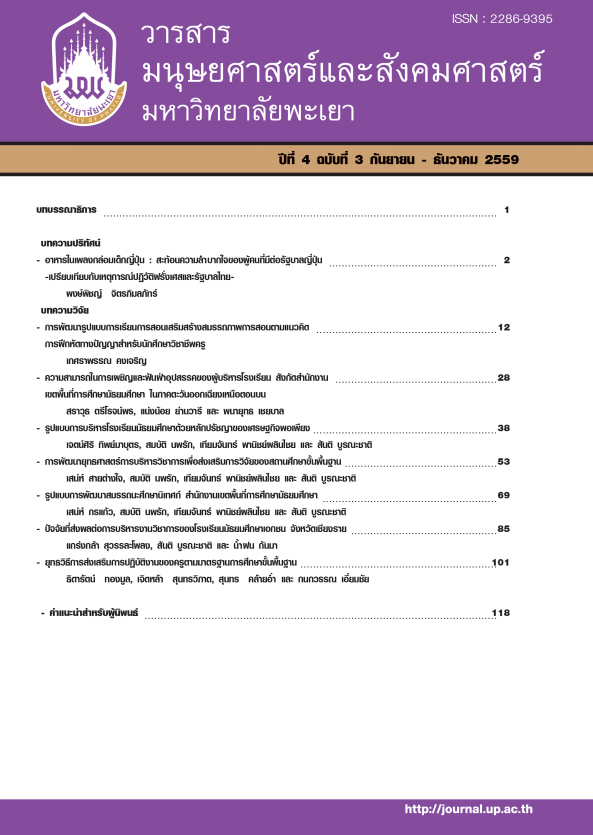The Secondary School Administrative Model with the Core of Sufficiency Economy
Keywords:
Model, Administrative, the Secondary School, the Core of Philosophy, Sufficiency EconomyAbstract
The main objective of this research is to develop the secondary school administrative model with the core of sufficiency economy by 1) studying the conditions and administrative methods, 2) the administrative model is formatted and 3) evaluating the possibility of the secondary school administrative model with the core of sufficiency economy
The research 3 procedures are: 1) Studying the conditions through analysis of related documents and literature reviews and the request opinions of the director, supervisors and teachers 845 persons through the questionnaire by mean and standard deviation then interviewing the administrative methods from 10 directors through the semi-structure interview, 2) The result from the 1st step is used to formatted the secondary school administrative model with the core of sufficiency economy which is considered by focus group discussion, 3) The possibility of the model is evaluated by mean and standard deviation.
The results of the research are:
1) The conditions of the secondary school administration with the core of sufficiency economy as a whole had been done in the high level, and had used school-based management, applied the King’s work with global Knowledge and local wisdom together with moderate practice according to sufficiency, rules and laws. The educational materials have been managed sufficiently for jobs, teaching activities, supervising, evaluating. Supporting and exchanging to develop creating activities of students, teachers and directors according to their performances emphasizing economic, social, environment and culture for sustainable development.
2) The secondary school administrative model with the core of sufficiency economy as a dynamic administrative model consists of: the principle procedure with 5 administrative processes 1) Decision-making –D 2) Planning – P 3) Operating-O 4) Evaluating -E and 5) Appropriate-acting – A, and uses moderate practice, which is in the sufficiency economy, within every process.
3) For the results, the possibility of the secondary school administrative model with the core of sufficiency economy has been evaluated as in the high level.
References
ธีระ รุญเจริญ. การบริหารโรงเรียนยุคปฏิรูปการศึกษา. กรุงเทพฯ: ข้าวฟ่าง; 2550.
กระทรวงศึกษาธิการ. คู่มือการบริหารสถานศึกษาขั้นพื้นฐานที่เป็นนิติบุคคล. กรุงเพทฯ: (องค์การรับส่งสินค้าและพัสดุภัณฑ์ (ร.ส.พ.); 2546.
__________________________. รายงานวิจัยผลกระทบโลกาภิวัตน์ต่อการจัดการศึกษาไทยใน 5 ปีข้างหน้า. กรุงเทพมหานคร: บริษัท ออฟเชท เพรส จำกัด; 2550.
มูลนิธิสยามกัมมาจล. ปรัชญาของเศรษฐกิจพอเพียง: จากหลักคิดสู่วิถีปฏิบัติ. กรุงเทพฯ: อมรินทร์พริ้นติ้งแอนด์พับลิชซิ่ง จำกัด (มหาชน); 2556.
สุรินทร์ ภูสิงห์. การพัฒนารูปแบบการจัดการศึกษาโดยบูรณาการปรัชญาเศรษฐกิจพอเพียงในโรงเรียนมัธยมศึกษาสำนักงานเขตพื้นที่การศึกษาอุบลราชธานี. วิทยานิพนธ์ กศ.ด. (การบริหารและพัฒนาการศึกษา), มหาวิทยาลัยราชภัฏมหาสารคาม, มหาสารคาม. 2552.
ธีระ รุญเจริญ. ความเป็นมืออาชีพในการจัดและบริหารการศึกษา ยุคปฏิรูปการศึกษาเพื่อปฏิรูปรอบ 2 และประเมินภายนอกรอบ 3 (พิมพ์ครั้งที่ 6). กรุงเทพฯ: ข้าวฟ่าง; 2553.
กังวาล ปัญญานิรมิตร. การบริหารจัดการตามหลักปรัชญาของเศรษฐกิจพอเพียง: กรณีศึกษาโรงเรียนบ้านเหลื่อมพิทยาสรรพ์ สำนักงานเขตพื้นที่การศึกษามัธยมศึกษา เขต 31. วิทยานิพนธ์ ศศ.ม. (การบริหารการศึกษา). มหาวิทยาลัยขอนแก่น. 2556.
ทัศนีย์ ลักขณาภิชนชัช. โครงการศึกษาโรงเรียนต้นแบบเศรษฐกิจพอเพียง. กรุงเทพมหานคร: ธรรมสาร; 2550.
เกษม วัฒนชัย (วิทยากร). (25 สิงหาคม 2554).CSR ตามหลักปรัชญาของเศรษฐกิจพอเพียง. (พิมพ์ครั้งที่ 2, 2556, กรุงเทพฯ: สำนักงานทรัพย์สินส่วนพระมหากษัตริย์). ห้องประชุมบอลรูม 3 ชั้น Lobby โรงแรมแกรนด์ไฮแอท เอราวัณ: CSR Club สมาคมบริษัทจดทะเบียนไทย.
จรวยพร ธรณินทร์ (ผู้บรรยาย). (6 ธันวาคม 2550). การนำเศรษฐกิจพอเพียงสู่ระบบการศึกษา. หอประชุมมหาวิทยาลัยราชภัฏ-นครสวรรค์: มหาวิทยาลัยราชภัฏนครสวรรค์.
ธีระ รุญเจริญ, จำเริญรัตน์ จิตต์จิรจรรย์, วรสิทธิ์ รัตนวราหะ. รายงานการวิจัยโครงการสังเคราะห์การประเมินตนเองของโรงเรียนศูนย์สถานศึกษาพอเพียง. กรุงเทพฯ: มูลนิธิยุวสถิรคุณ; 2557.
หอการค้าไทย. เศรษฐกิจพอเพียง: ปรัชญาใหม่ในยุคโลกาภิวัตน์ (Sufficiency Economy: A new Philosophy in the Global World). กรุงเทพฯ: อมรินทร์พริ้นติ้ง แอนด์พับลิชชิ่ง; 2550.
ทิศนา แขมมณี. ถอดรหัสปรัชญาของเศรษฐกิจพอเพียง. กรุงเทพฯ: สำนักพิมพ์แห่งจุฬาลงกรณ์มหาวิทยาลัย; 2558.
กนิษฐา นาวารัตน์ และ คณะ. พจนานุกรมอังกฤษ-ไทย (Times-chambers Learners’ Dictionary. กรุงเทพฯ: ดอกหญ้า; 2540.
Cambridge Advanced Learner’s Dictionary (3rded.). Singapore: Green Giant Press.
สาคร สุขศรีวงศ์. การจัดการ: จากมุมมองนักบริหาร (พิมพ์ครั้งที่ 9) (Management: from the Executive’s Viewpoint) กรุงเทพฯ: บริษัท จี.พี.- ไซเบอร์พรินทร จำกัด; 2555.
สมเดช สีแสง. คู่มือบริหารโรงเรียน สถานศึกษาขั้นพื้นฐานตาม พ.ร.บ.การศึกษาแห่งชาติ (พิมพ์ครั้งที่ 3). นครสวรรค์: ริมปิงการพิมพ์; 2554.
อินาโมริ คาซึโอะ. ถอยก็ตาย วิกฤติยังไงก็ต้องสู้. (สุดารัตน์ เอื้อเปี่ยมมงคล, ผู้แปล). กรุงเทพ: ตถาตา พับลิเคชั่น. (ต้นฉบับภาษาญี่ปุ่น พิมพ์ ค.ศ. 2013). 2559.
Downloads
Published
How to Cite
Issue
Section
License
ผู้นิพนธ์ต้องรับผิดชอบข้อความในบทนิพนธ์ของตน มหาวิทยาลัยพะเยาไม่จำเป็นต้องเห็นด้วยกับบทความที่ตีพิมพ์เสมอไป ผู้สนใจสามารถคัดลอก และนำไปใช้ได้ แต่จะต้องขออนุมัติเจ้าของ และได้รับการอนุมัติเป็นลายลักษณ์อักษรก่อน พร้อมกับมีการอ้างอิงและกล่าวคำขอบคุณให้ถูกต้องด้วย
The authors are themselves responsible for their contents. Signed articles may not always reflect the opinion of University of Phayao. The articles can be reproduced and reprinted, provided that permission is given by the authors and acknowledgement must be given.








